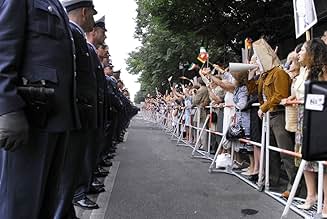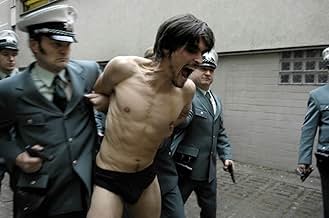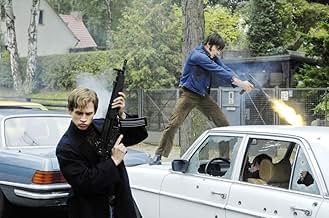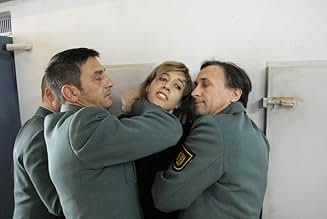NOTE IMDb
7,3/10
41 k
MA NOTE
Un regard sur la faction Armée rouge, le groupe terroriste allemand qui organisa des attentats, des braquages, des enlèvements et des assassinats à la fin des années 1960 et 1970.Un regard sur la faction Armée rouge, le groupe terroriste allemand qui organisa des attentats, des braquages, des enlèvements et des assassinats à la fin des années 1960 et 1970.Un regard sur la faction Armée rouge, le groupe terroriste allemand qui organisa des attentats, des braquages, des enlèvements et des assassinats à la fin des années 1960 et 1970.
- Nommé pour 1 Oscar
- 4 victoires et 22 nominations au total
Niels-Bruno Schmidt
- Jan Carl Raspe
- (as Niels Bruno Schmidt)
Hans Werner Meyer
- Klaus-Rainer Röhl
- (as Hans-Werner Meyer)
Histoire
Le saviez-vous
- AnecdotesAs an immediate reaction to the movie, Ignes Ponto, widow of Jürgen Ponto, whose assassination is portrayed in the movie, returned her Federal Cross of Merit. She was angry that the Federal Republic of Germany has never even created a memorial for victims of the RAF, but instead helped to finance films like this one about the members of the RAF. Also, she said, she had not been warned about the graphic portrayal of Ponto's assassination when she was invited to the movie premiere and felt humiliated by the producers for making her sit through this without a warning. About a month later, she filed a lawsuit against the producers, who claimed that every scene is historically accurate, because the assassination of her husband, which she had to witness from the next room, was not portrayed as it happened. She demands the scene of the murder of her husband be cut from the movie. The filmmakers claim that they had tried to contact her during production to get the scene right but she had no desire to cooperate. Before this movie, there had been no portrayal of Ponto's assassination on film and she felt the staging of the movie was lurid and dishonoring to her husband. As of this writing, no decision has been reached about the lawsuit.
- GaffesUlrike Meinhof's twin daughters Bettina and Regine first appear in the opening scene in 1967 when they are 9 years old. Yet 3 years later when living in Sicily and rescued by Stefan Aust, they haven't aged at all.
- Citations
Ulrike Meinhof: If you throw a stone, it's a crime. If a thousand stones are thrown, that's political. If you set fire to a car it's a crime; if a hundred cars are set on fire that's political.
- ConnexionsFeatured in Guinness World Records - Die größten Weltrekorde: Épisode #5.1 (2008)
- Bandes originalesMercedes Benz
Written by Janis Joplin, Michael McClure
Performed by Janis Joplin
Produced by Paul A. Rothchild
Commentaire à la une
I agree with the other comments on the following points: the film does indeed concentrate on the culprits and their actions in a documentary way (as opposed to an interpretation of the RAF's ideas and motivations from a clear-cut political standpoint). Although the victims DO appear they are not characterized more closely; the only representative of the state is Horst Herold (head of the BKA), politicians do not show up at all, the media appear only in the shape of Springer, konkret and Spiegel and even the lawyers (Haag, Croissant, Schily, Ströbele, etc.) are merged into only one (fictitious?) character. I for one do agree with this approach and if you are prepared for it you probably can live with it too. In any case, despite all the chases, shootouts and explosions it hasn't become a mere action-film.
What's more problematic is that the film follows the book by Stefan Aust VERY closely. Therefore the dramaturgy is more similar to "real life" than to a classical feature film (e.g. there are many changes in pace, several climaxes are distributed over the course of the film and a proper arc of suspense is somewhat missing). "Fortunately" real life offered a culmination of events with the Schleyer kidnapping in the "German Autumn" 1977, so that the film ends in a reasonably satisfying way. Nevertheless the end credits come a little abruptly.
The second problem is that the film tries to show virtually ALL events from the book (only some minor incidents like the Mahler detention, Peter Urbach, the burglaries in registration offices in order to steal blank passports or the visit of Jean-Paul Sartre in Stammheim are missing) so that it needs to squeeze 10 years of history into 140 minutes. The result is a film with breakneck speed at some points. The better scenes (e.g. the training camp in Jordan or the lawsuit in Stammheim) are obviously those where the film catches breath, calms down and takes its time for the actors to shine.
The quality of the acting ranges from good to fantastic (with very few exceptions like Alexandra Maria Lara, who is nothing more than wide-eyed again and who thankfully doesn't even have dialogue). Especially Martina Gedeck and Johanna Wokalek are sensational. It is THEIR film and the conflicts in Stammheim which led to Meinhof's suicide are acted Oscar-worthy. But Michael Gwisdek (Ensslin's father), Jan Josef Liefers (Peter Homann), Sebastian Blomberg (Rudi Dutschke), Nadja Uhl (Brigitte Mohnhaupt) and Hannah Herzsprung (Susanne Albrecht) are also very good.
The production values are excellent too. A lot of locations, a great deal of main and supporting roles, hundreds of extras, good special effects (mainly explosions) and a set design and costume design which creates a very coherent 70's atmosphere: you can see that the film cost a lot of money. Every cent is on the screen.
I didn't like the choice of music that much. Deep Purple's "Child in Time" is always great to hear, but the rest (Janis Joplin, The Who, Bob Dylan) is just too mainstreamy and unimaginative for my taste (but probably also very expensive). Why not use MC5, Ton Steine Scherben or Ennio Morricone's "Vamos a matar, companeros"?
Now I'm looking forward to the reactions and reviews from other countries, who probably don't know this part of German history very well. In the US I expect the criticism that there are too many naked people, too many swear words and even more cigarettes (every one in BMK smokes everywhere and at all times), in order to distract from the politics of the film ;-) "Der Baader Meinhof Komplex" isn't the masterpiece on the history of the first generation of the RAF that I had hoped for in my comments on "Todesspiel", but altogether it is a very suspenseful, fascinating, densely narrated and well acted film. Hopefully it will not be the last word on the subject, but it succeeds in giving the audience the basic RAF knowledge on which future (less neutral, more opinionated) movies can build their stories.
What's more problematic is that the film follows the book by Stefan Aust VERY closely. Therefore the dramaturgy is more similar to "real life" than to a classical feature film (e.g. there are many changes in pace, several climaxes are distributed over the course of the film and a proper arc of suspense is somewhat missing). "Fortunately" real life offered a culmination of events with the Schleyer kidnapping in the "German Autumn" 1977, so that the film ends in a reasonably satisfying way. Nevertheless the end credits come a little abruptly.
The second problem is that the film tries to show virtually ALL events from the book (only some minor incidents like the Mahler detention, Peter Urbach, the burglaries in registration offices in order to steal blank passports or the visit of Jean-Paul Sartre in Stammheim are missing) so that it needs to squeeze 10 years of history into 140 minutes. The result is a film with breakneck speed at some points. The better scenes (e.g. the training camp in Jordan or the lawsuit in Stammheim) are obviously those where the film catches breath, calms down and takes its time for the actors to shine.
The quality of the acting ranges from good to fantastic (with very few exceptions like Alexandra Maria Lara, who is nothing more than wide-eyed again and who thankfully doesn't even have dialogue). Especially Martina Gedeck and Johanna Wokalek are sensational. It is THEIR film and the conflicts in Stammheim which led to Meinhof's suicide are acted Oscar-worthy. But Michael Gwisdek (Ensslin's father), Jan Josef Liefers (Peter Homann), Sebastian Blomberg (Rudi Dutschke), Nadja Uhl (Brigitte Mohnhaupt) and Hannah Herzsprung (Susanne Albrecht) are also very good.
The production values are excellent too. A lot of locations, a great deal of main and supporting roles, hundreds of extras, good special effects (mainly explosions) and a set design and costume design which creates a very coherent 70's atmosphere: you can see that the film cost a lot of money. Every cent is on the screen.
I didn't like the choice of music that much. Deep Purple's "Child in Time" is always great to hear, but the rest (Janis Joplin, The Who, Bob Dylan) is just too mainstreamy and unimaginative for my taste (but probably also very expensive). Why not use MC5, Ton Steine Scherben or Ennio Morricone's "Vamos a matar, companeros"?
Now I'm looking forward to the reactions and reviews from other countries, who probably don't know this part of German history very well. In the US I expect the criticism that there are too many naked people, too many swear words and even more cigarettes (every one in BMK smokes everywhere and at all times), in order to distract from the politics of the film ;-) "Der Baader Meinhof Komplex" isn't the masterpiece on the history of the first generation of the RAF that I had hoped for in my comments on "Todesspiel", but altogether it is a very suspenseful, fascinating, densely narrated and well acted film. Hopefully it will not be the last word on the subject, but it succeeds in giving the audience the basic RAF knowledge on which future (less neutral, more opinionated) movies can build their stories.
- ChrisWasser
- 29 sept. 2008
- Permalien
Meilleurs choix
Connectez-vous pour évaluer et suivre la liste de favoris afin de recevoir des recommandations personnalisées
Détails
- Date de sortie
- Pays d’origine
- Site officiel
- Langues
- Aussi connu sous le nom de
- The Baader Meinhof Complex
- Lieux de tournage
- Sociétés de production
- Voir plus de crédits d'entreprise sur IMDbPro
Box-office
- Budget
- 20 000 000 € (estimé)
- Montant brut aux États-Unis et au Canada
- 476 270 $US
- Week-end de sortie aux États-Unis et au Canada
- 17 348 $US
- 23 août 2009
- Montant brut mondial
- 26 937 355 $US
- Durée2 heures 30 minutes
- Couleur
- Mixage
- Rapport de forme
- 1.85 : 1
Contribuer à cette page
Suggérer une modification ou ajouter du contenu manquant

Lacune principale
By what name was La bande à Baader (2008) officially released in India in Hindi?
Répondre




































